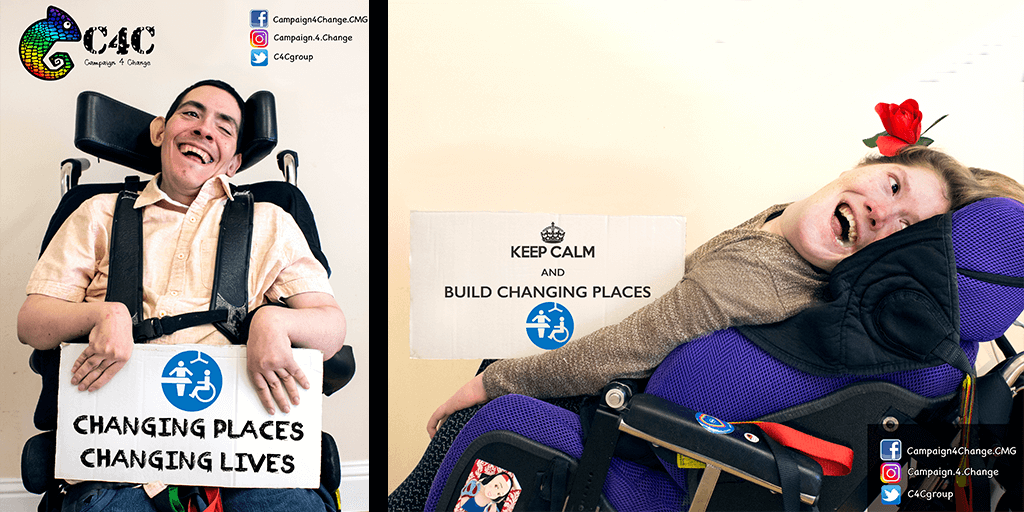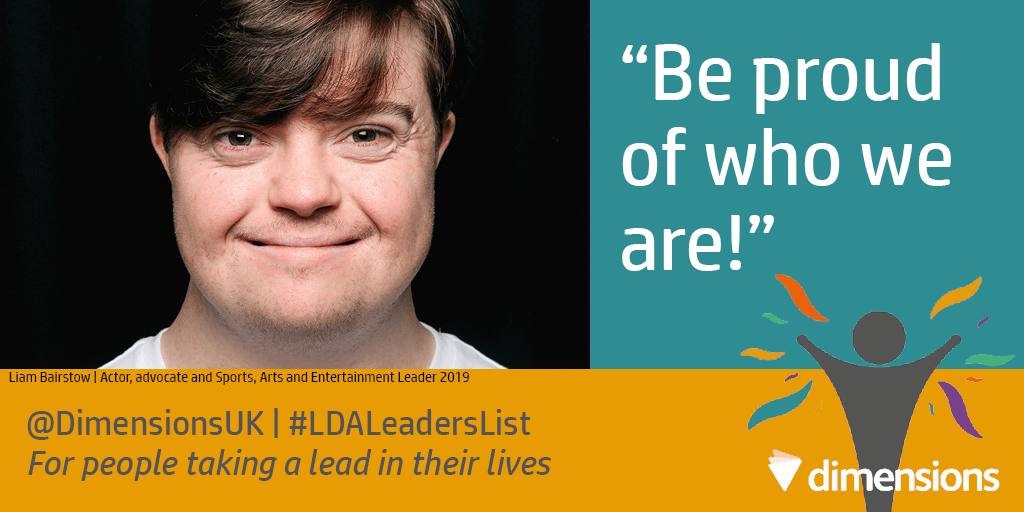The Leaders List and "profound and multiple learning disabilities"
“People with PMLD.” “She’s got PMLD.”
It sounds blooming awful, doesn’t it? Profound and multiple learning disabilities are not a disease. Nor should they be the thing that defines the individual – and the language above certainly puts the person’s disability at the heart of who they are.
So yes, this blog is about the labels we put on people.
In general I think Dimensions is quite sensitive to labelling people. We avoid ‘he’s non-verbal’ for instance, preferring the more empowering ‘he does not use words to communicate.’ We talk about the people we support, never about service users or customers. We try to avoid ‘us and them’ language and mind-sets.
Why did we add a category to a previous year’s Leaders’ List for people with profound and multiple learning disabilities?
Simply by so doing, are we not batching people up, classifying them by their impairment?
Why can’t people with profound and multiple learning disabilities win a spot in the ‘Advocacy, Policy and Media’ or ‘Changing Communities’ categories on their own merits?
Are we discriminating against them because of who they are and, indeed, undermining the very purpose of this List?
These are all questions that have been asked of us around this decision.

I’ll explain the reasoning below, without any conceit that everyone will agree with it…
The Learning Disability and Autism Leaders List aims to celebrate achievements, and raise the media profile, of people with all types of learning disability and autism.
Judges, who come from right across our sector including many people with learning disabilities and autism themselves, are briefed to take a person’s disability into account when making the difficult decisions around who makes the List. Last year, mathematicians will have noticed, 90% of nominees (all of whom received a certificate) did not win a place on the List. It is a high bar.
The bulk of nominations were for people with mild to moderate autism doing fantastic work to empower other autistic people and change society’s attitudes. Very many of them deservedly won a place on the List.
But the List is intended to be broader than that. We want to support people who would not ordinarily be heard to raise their profile and to spread their message through the media. Those least likely to be heard will be those with the greatest challenges and we successfully secured nominations for people with all sorts of complex challenges in life.

But last year, not a single person with a profound and multiple learning disability made the List. It wasn’t down to the judges; just two of the six hundred nominees had an acknowledged profound and multiple learning disability.
Is it because no-one with a profound and multiple learning disability is doing anything worthy of making the List? Certainly not. So the only conclusion is that for some reason, potential nominees were being overlooked. I’m not going to speculate why.
Our response was to raise a flag proclaiming that this List is for people with profound and multiple learning disabilities too – and to fly this flag in the form of a dedicated category for this year’s judges to consider.
To get people thinking of who they could nominate. And perhaps, if there is no-one to nominate, to ask themselves the harder question – why not?

However, you won’t see those winners segregated out into a separate category. (The same is true of our Group winners.)
Whilst it is right to judge people with profound and multiple learning disabilities and group nominees separately, we think it is also right to incorporate the winners into our overarching four categories: ‘Advocacy, policy and the media’, ‘Local communities’, ‘Sport art and entertainment’ and ‘Work and education’.

This year, I am pleased to say, we have received nominations for people with profound and multiple learning disabilities. Not loads, but enough for the List to be able to champion those least likely to have a voice in our country. Is that worth propagating the PMLD label? I believe so – but you be the judge.
Share your thoughts
Please read the thoughts of three experts below, and share yours using the online form. We will use this feedback to influence how we approach this matter future Learning Disability and Autism Leaders’ Lists.
This blog was written by Dimensions Head of Marketing and Communications, Duncan Bell.
Christian Raphael MBE, blogger with profound and multiple learning disabilities, comments through his Circle

We all see Christian as the centre of our group. We take our lead from him and are honest in recognising that he cannot achieve alone. Christian is a leader on many fronts but every day has to challenge traditional perceptions of Leadership, Power and Control.
Christian’s mother, Vicki, adds:
“Christian was 33 on Sunday (at time of writing) and has lived with his family and friends through quite a slice of history, changes in attitude, policy and opportunity.
“As someone who does not have access to words, Christian asks us all to listen and respond in many ways. These interactive relationships are complex.
“Like many people in Christian’s situation this complexity is not always recognised and he is offered a world of simplification…easy read, picture symbols and certainly nothing to suggest that he is leading, reforming and challenging perceptions.
“I think, perhaps, that there was not an opportunity in last year’s Leaders List for judges to be supported and challenged to understand what Leadership may look like for Christian and his particular peer group.”
Liz Wilson, Dimensions Family Consultant, comments:

“People with lots of needs are invisible even in learning disability circles. They are often segregated in ‘extra special’ isolated services. Few events (whether social or ‘involvement and engagement’) are made accessible to them as there is a perception that people who can’t speak or sign also can’t understand or contribute.
“This assumption has been proven wrong in a book or two’s worth of ways. However, the view persists.
“People with lots of support needs cannot make an application to the Leaders’ List or anything else without the support of great allies, whether family, friends or paid supporters. But too many people filter out people with a PMLD label from opportunities to make a contribution and live a life.
“How many people can you name who role model a great life in these circumstances?
“Let’s start where people are at and express things in ways they understand to enable people with lots of needs to be considered as role models worthy of recognition.
“Let’s model better ways of sharing more stories and help more people to understand that nobody is excluded.
“We’ve got a long way to go before separate categories aren’t needed for disabled people, people with learning disabilities and autism, people with lots of needs…To put it in a bit of context, Bernadine Evaristo is the first black woman to win the Booker prize – in 2019.
“I hope this sparks some good debate and gets more people with lots of needs into the public view in a good way.”
Sam Clark, CEO, Learning Disability England, comments:
“This is an important discussion to have. It has already helped me realise that recently we have not been talking about inclusion and how our work is driven by it. We are changing that.
“Some time ago, Scottish Human Services and people in the international inclusion movement developed the ‘Values of Inclusion’ – you can find a copy of this on the Learning Disability England website.
“We all need to challenge ourselves on if or how we are living these values. If we were there’d be loads of different Leaders’ List winners….or perhaps, there would be no need for this List in the first place!”











